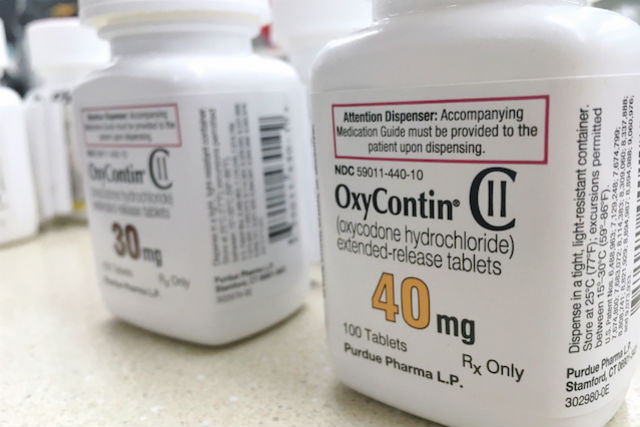The lawsuit represents communities in 26 states and eight tribes and accuses Sackler family members of knowingly breaking laws in order to enrich themselves to the tune of billions of dollars, while hundreds of thousands of Americans died.
“Eight people in a single family made the choices that caused much of the opioid epidemic,” the lawsuit, filed earlier this week in federal court in the southern district of New York, states.
The same eight members of the family had recently been added to a small number of lawsuits that are underway against a string of opioid-makers, including the Connecticut-based pharmaceutical company the Sacklers wholly-own, Purdue Pharma, but they have not been sued as individuals on anything like this scale before.
“This nation is facing an unprecedented opioid addiction epidemic that was initiated and perpetuated by the Sackler Defendants for their own financial gain, to the detriment of each of the Plaintiffs and their residents. The ‘Sackler Defendants’ include Richard Sackler, Beverly Sackler, David Sackler, Ilene Sackler Lefcourt, Jonathan Sackler, Kathe Sackler, Mortimer DA Sackler, and Theresa Sackler,” this week’s lawsuit states.
The eight are the most high-profile members of a family which has long been known for prolific philanthropy to famous arts and education institutions, including the Metropolitan and Guggenheim museums in New York, which have faced fierce recent protests against the taking of Sackler money. Other institutions include Columbia, Yale, MIT, Tufts and other US universities, and, in the UK, the Victoria & Albert Museum, the Serpentine Gallery, Glasgow University and other recipients.
Earlier this week Britain’s National Portrait Gallery decided not to take up the offer of a £1m Sackler family grant and, in the US, Columbia University and the University of Washington, which have both received Sackler donations in the past, have announced they are not now accepting gifts from the family.
Court documents accuse the eight family members of purposely playing down the dangers of the prescription painkiller OxyContin, which is more potent than heroin or morphine. They are accused of deceiving doctors and patients and directing sales and marketing techniques that drove huge over-prescribing and ever stronger doses for many patients who should never have been prescribed the pills in the first place.
“The defendants’ actions caused and continue to cause the public health epidemic…caused deaths, serious injuries, and a severe disruption to public peace, order and safety, it is ongoing and it is producing permanent and long-lasting damage,” the court documents allege.
Many of the allegations have already been made public in a lawsuit naming the same eight family members in Massachusetts, and are contained in court documents in the multi-district litigation taking place in a federal court in Cleveland, Ohio, which has been brought against Purdue and other companies, though no members of the Sackler family individually, by more than 1,200 cities and counties.
The family and Purdue deny wrongdoing.
“This complaint is part of a continuing effort by contingency-fee counsel to single out Purdue, blame it for the entire opioid crisis in the United States, and try the case in the court of public opinion rather than the justice system,’’ Robert Josephson, a Purdue spokesman, said in an emailed statement to the Bloomberg news agency.
“These baseless allegations place blame where it does not belong for a complex public health crisis, and we deny them,’’ the Mortimer and Raymond Sackler families said in a statement. They also noted OxyContin sales “represented a tiny portion of the opioid market”.
The lawsuit filed in New York on 18 March is extraordinary because it focuses almost entirely on the individual Sacklers.
Richard and Jonathan Sackler are sons of the late Raymond Sackler, one of the founding brothers of Purdue. Beverly is Raymond’s widow and David his grandson.
Ilene, Kathe and Mortimer David Alfons are children of the late Mortimer Sackler, another of the founding brothers of Purdue, and Theresa is his widow.
The only other defendants named in the lawsuit are the family trust connected to Raymond Sackler’s branch of the family and Rhodes Pharmaceuticals, a company owned by the Sacklers that produces generic opioid painkillers.
Other cases focus mostly on Purdue and other well known pharmaceutical giants involved in opioid production, such as Johnson & Johnson and Allergan.
The lawsuit in the southern district of New York has been brought by city and county authorities across America, including, for example, 42 counties and cities in Alabama, 31 counties in California, 21 cities and counties in Florida, 28 counties in Illinois, 51 cities and counties in Kentucky, more than 100 towns and cities in Massachusetts and dozens of cities and counties in other states including Wisconsin, Virginia, Utah, Tennessee, Missouri, New Hampshire, New Mexico, Indiana and Michigan.
Among the eight Native American tribes suing the Sacklers are parts of the Cherokee, the Chippewa and the Sioux, the Oneida Nation and the Blackfeet.
Drug overdoses now kill more than 72,000 people in the US a year, according to government figures from the Centers for Disease Control and Prevention, and 49,000 of those are caused by opioids.
Purdue’s business has attracted a wave of lawsuits alleging deception about the safety of OxyContin, which the company had admitted misbranding in a 2007 criminal case.
Purdue has not ruled out filing for bankruptcy, which would cause a hiatus in the civil cases brought against it, but also indicates it could be short of the kind of funds that would be needed for a massive settlement or a fine at trial in the cases against it, to compensate communities for the cost of the crisis.
But a victory in the latest lawsuit against the Sacklers would give the plaintiffs access to the Sacklers’ personal fortune.
By Joanna Walters
